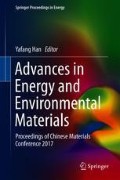Abstract
Aiming at the problem of heat dissipation of electronic devices in low temperature environment, the effect of thermal conductivity and emissivity of coating on its heat dissipation performance was studied by theoretical calculations and experiments in this study. The results show that the heat dissipation performance of organic coating with emissivity of 0.7–0.95 is improved as its thermal conductivity increasing. And temperature difference between inside and surface of object is inversely proportional to thermal conductivity. That is, when thermal conductivity exceeds a certain value, it will no longer affect heat dissipation performance of coating. In addition, emissivity of coating directly affects its cooling performance, and the proper matching interaction between thermal conductivity and emissivity of coating can enhance heat dissipation effects. In the case of non-forced convection cooling, the thermal conductivity of the organic coating is preferably 2–10 W/m·K.
Access this chapter
Tax calculation will be finalised at checkout
Purchases are for personal use only
References
S. Wijewardane, D.Y. Goswami, A review on surface control of thermal radiation by paints and coatings for new energy applications. Renew. Sustain. Energy Rev. 16, 1863–1873 (2012)
J. Wu, S. Li, W. Yang et al., Study on heat sinks for high power LEDs. Semicond. Technol. 35, 964–967, 1027 (2010)
Zihui Lang, Effect of composite surface treatment on CPU radiator performance. Autom. Instrum. 155, 155–157 (2011)
S. Kim, J. Kim, J.H. Kim, Fabrication of insulated metal substrates with organic ceramic composite films for high thermal conductivity. Ceram. Int. 43, 8294–8299 (2017)
K. Zhao, K.H. Hua, A.Z. Shui, Application of infrared radiation coating in LED heat dissipation. Bull. Chin. Ceram. Soc. 34, 172–176 (2015)
Y.J. Nie, L.J. Jin, J.Z. Hang, et al., Preparation and properties of waterborne nano-composite heat dissipative coating. J. Funct. Mater. 44, 736–739, 743 (2013)
X. Han, X. Cui, K. Ma et al., Carbon nano-capsule coating for high-power LED thermal management. Mater. Res. Innovations 19, 1112–1116 (2015)
H. Zhang, P. Lou, F.W. Liu et al., Effect of carbon nanotube structure on properties of infrared radiation heat sink coatings. Shanghai Coat. 54, 1–5 (2016)
J. Li, J. Liang, Y. Liu, High-thermal conductive coating used on metal heat exchanger. Chin. J. Chem. Eng. 22, 596–601 (2014)
H. Im, J. Kim, The effect of Al2O3 doped multi-walled carbon nanotubes on the thermal conductivity of Al2O3/epoxy terminated poly(dimethyl siloxane) composites. Carbon 49, 3503–3511 (2011)
Acknowledgements
This research was financially supported by Funding Project for Academic Human Resources Development in Institutions of Higher Learning Under the Jurisdiction of Beijing Municipality.
Author information
Authors and Affiliations
Corresponding author
Editor information
Editors and Affiliations
Rights and permissions
Copyright information
© 2018 Springer Nature Singapore Pte Ltd.
About this paper
Cite this paper
Mao, Q. et al. (2018). Effect of Conductivity and Radiation on Heat Dissipation Performance of Coating. In: Han, Y. (eds) Advances in Energy and Environmental Materials. CMC 2017. Springer Proceedings in Energy. Springer, Singapore. https://doi.org/10.1007/978-981-13-0158-2_76
Download citation
DOI: https://doi.org/10.1007/978-981-13-0158-2_76
Published:
Publisher Name: Springer, Singapore
Print ISBN: 978-981-13-0157-5
Online ISBN: 978-981-13-0158-2
eBook Packages: EnergyEnergy (R0)

